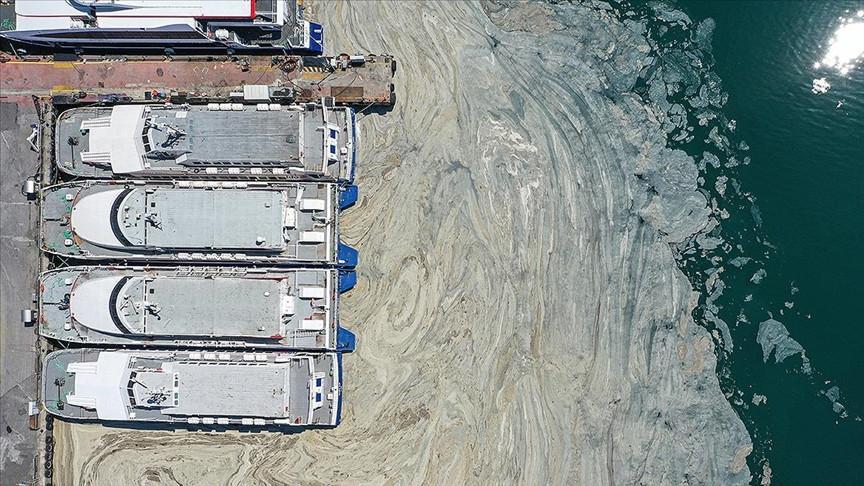
Turkey launched a massive cleanup campaign in 15 districts of seven provinces along the coast of the Marmara Sea on June 8 in an effort to eliminate the aggravating mucilage problem that has severely affected the marine ecosystem.
Based on the 22-point action plan announced by the Environment and Urbanization Ministry on June 6, authorities started a comprehensive cleaning campaign in Istanbul, Kocaeli, Bursa, Balıkesir, Yalova, Çanakkale and Tekirdağ.
Within the scope of this massive campaign, mucilage collected with the help of vacuum trucks is being taken to treatment facilities in Istanbul, Tekirdağ, Kocaeli and Balıkesir.
“Today, we are starting the country’s biggest campaign movement. The Marmara Sea will remain a protected area until the end of this year,” Environment and Urbanization Minister Murat Kurum said in a ceremony held in the Caddebostan beach in Istanbul.
According to ministry officials, the Marmara Sea will be a clean sea again within five years.
Mucilage is the overgrowth of microscopic algae called phytoplankton. The thick, mucus-like slimy layer contains a variety of microorganisms and is caused by an increase in seawater temperature due to global warming, still water and pollution.
The nonstop cleaning work will be carried out by the ministries of environment, transportation, agriculture, health and interior as well as related institutions, NGOs and municipalities under the coordination of governor’s offices of provinces that are near the sea’s coastline.
The regional tourism industry, which faced tough days due to the coronavirus-related restrictions imposed by the government previously, is facing another severe blow due to mucilage that has vividly appeared on the sea.
Movers and shakers of the industry are afraid of last-minute cancellations by tourists due to the spread of mucilage that has taken the Marmara Sea under its grip.
“Erdek [a district in the province of Balıkesir] is the pearl of Marmara. But the 15-kilometer long coastline of Erdek is full of mucilage. At some points, you cannot see the sea,” said Mustafa Sarı, a professor from Bandırma Onyedi Eylül University.
According to local tourism professionals, the rate of swimming in the waters near the Erdek coastline has decreased by 40 percent this June compared to the last year.
“No sea; no tourist. There will be hell to pay due to mucilage,” a hotel owner said while complaining about the situation.
“People use to drink tea and watch the sea. Now all they see is the sea snot. Besides, we cannot sell fish, because customers are afraid to eat fish,” a cafe owner in Erdek said.
A hotel owner in the province of Tekirdağ’s Kumbağ district highlighted that customers on phone specifically ask whether the sea nearby was clean before making reservations.
Some of the hotel owners have even started posting images and videos showing the clean side of the sea on their social media accounts in a bid to convince customers not to cancel reservations.
Meanwhile, the ruling Justice and Development Party (AKP) and Nationalist Movement Party (MHP) entered separate motions to the parliament about the mucilage danger in the Marmara Sea.
“The reasons for the formation of the sea snot should be determined, in-depth analysis of the problem should be carried out and effective solutions should be made,” said the AKP’s motion given by Istanbul MP Mustafa Demir, asking for a parliamentary commission to be established immediately.
Separately, a Turkish academic in an Australian university indicated that fight against the mucilage could only be won with bacteriophage.
Reminding that some coasts of Australia were under attack of the mucilage in 2007, 2008 and 2013, İpek Karaböke, a microbiologist from Sunshine Coast University, advised not to use scoop nets while collecting sea snot.
“The scoop nets may cause worse situations. As they are not sterile, the bacteria may spread to a larger area,” said Karaböke in her interview with Turkish media.
The solution is the use of bacteriophage, a virus-eating bacterium, she added.
According to the expert, Australia solved the problem by spreading the virus-eating bacteria to the sea to eat the sea snot.